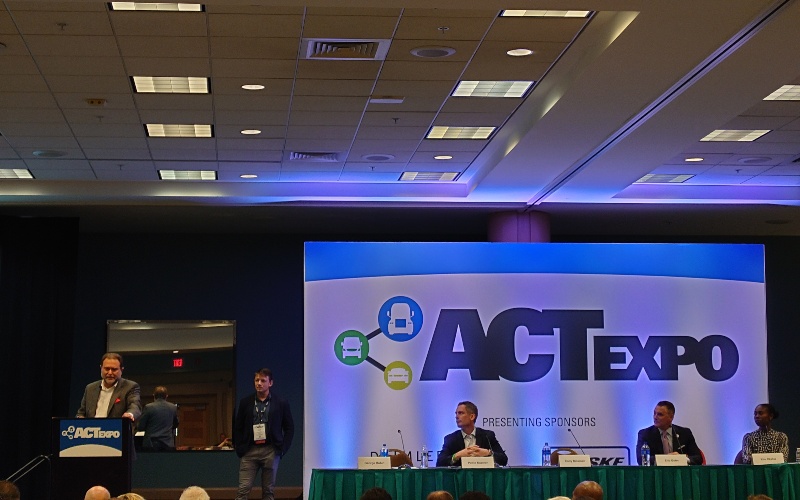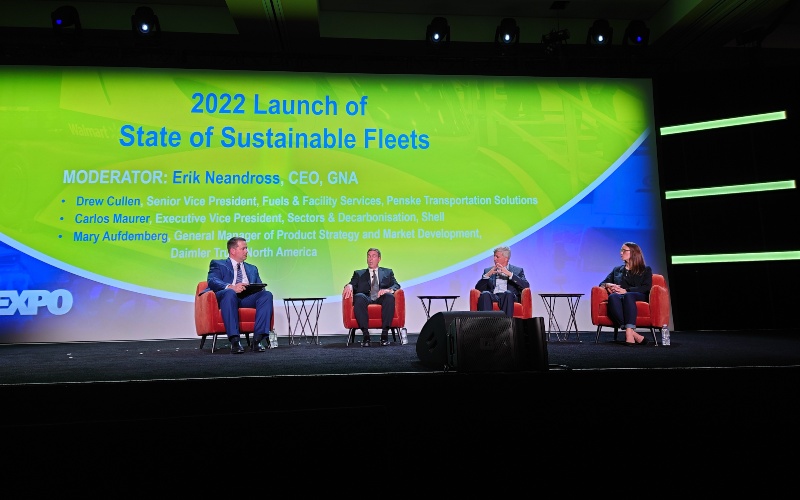
While the ACT 2021 Conference and Expo may have been an impromptu splash for the hydrogen and fuel cell industry, the ACT 2022 Conference and Expo is definitely a purposeful event for the industry. ACT 2022 has about 8,000 attendees, over 150 exhibitors, and plenty of people here are eager to talk about any part of the hydrogen and fuel cell ecosystem.

A filled conference room
Ballard, Chart, Hino, Hyundai, Hyzon, Gaussin, Loop Energy, Plug Power, Tevva, and many other companies all are advertising their products here. In fact, Gaussin brought over its truck from the 2022 Dakar Rally this past January (pictured below), which was an impressive debut.

Dakar Rally Truck
Today there was also a lot of talk among different panel discussions about hydrogen. At the “Hydrogen Workshop” it was clear that the overall landscape of the fuel cell and hydrogen industry is still evolving quite a bit. This evolution could be seen in Chart and Shell serving up different visions of the future. From Chart’s standpoint liquid hydrogen just makes sense, and it is not alone in its point of view considering that a vehicle using liquid hydrogen is going to have a greater range than one using gaseous hydrogen. However, cooling hydrogen to -424 and keeping it at that temperature with minimal energy input is not a small feat, which is why Shell currently dispenses hydrogen in gaseous form.
But dispensing gaseous hydrogen then brings up another question. Should it be done at 350 bars or 700 bars? For municipal buses and similar heavy-duty applications 350 bars works well 99% of the time, but the answer becomes less clear when it comes to long-haul trucking. Shell foresees a future where 700 bars makes sense while a company like Hyzon is focused on refueling its trucks with 350 bars hydrogen.

GenH2’s Cody Bateman talks liquid hydrogen
At the panel discussion on the mainstage in the afternoon Shell, Penske, and Daimler debated the merits of BEVs vs FCEVs. For Daimler the answer to zero emission mobility is BEVs for everything but long-haul trucking, which is where it believes FCEVs should take over. However, while Daimler was willing to share its vision of BEVs Mary Aufdemberg from Daimler was far less forthcoming regarding how BEVs can be a possibility given the state of electricity generation in the U.S. Shell’s Carlos Maurer complained about the difficulty of Shell having to provide 12 types of fuel (he was mum on where that number came from), and Penske’s Drew Cullen openly wondered if it would be known in the next 10 to 20 years what the correct answer is: BEVs or FCEVs.
One of the few rays of sunshine today was listening to Hyzon’s Craig Knight. Craig was the only industry professional at any of today’s panels that laid out the case for FCEVs while backing it up with a reasonable hydrogen production plan thanks to Raven SR.
However, more broadly, another encouraging sight today was to see at the different panels industry professionals from Ballard, Hyundai, and Hyzon talk about hydrogen and fuel cells in ways that appealed to every segment of the market whether it be governments, company owners, and even members of the general public. Not only was a term like total cost of ownership discussed in detail, but Hyzon’s Craig Knight clearly stated that the fuel cell stacks it produces were built for the heavy-duty industry.
Tomorrow Fuel Cells Works will be back at ACT and we will be interviewing industry professionals, and later in the week Fuel Cells Works will spend time with veterans Craig Knight and George Gu. Please check back tomorrow for more ACT updates.



Jesse Lyon, Contributor
The views and opinions expressed herein are those of the authors and do not necessarily reflect the official policy or position of Fuel Cells Works, its directors, partners, staff, contributors, or suppliers. Any content provided by our contributors or authors are of their own opinion and are not intended to malign any religion, ethnic group, club, organization, company, individual or anyone or anything.
Read the most up to date Fuel Cell and Hydrogen Industry news at FuelCellsWorks




